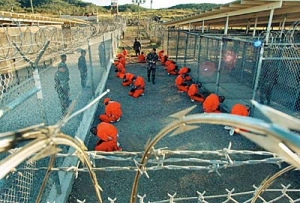
The legal motion, signed last night by Obama and the US Department of Defense, is due to be heard Wednesday by two judges chairing the commissions. It requests that the hearings be halted until May 20.
Proceedings before the Guantanamo military commissions in October and November included:
Mohammed Jawad's confession was ruled inadmissable due to torture according to the Guantanamo military commission examining his case.
The commission investigating Jawad has been the focus of several controversies, since charges were first filed. Major David Frakt, a reserve officer who is a law professor in civilian life, had expressed concern that the prosecution had been imposing delays on Jawad's access to possibly exculpatory evidence. The prosecution team had been warned about not being forthcoming with evidence by the presiding officer of the commission, Colonel Stephen Henley. Henley had warned the Prosecution team to be more forthcoming with evidence.
Colonel Henley excluded Jawad's confessions on Tuesday October 28, 2008. According to The Guardian:
The judge said he was accepting Jawad's account of what happened to him because the government had been unable to provide timely disclosure of evidence for the coming war crimes trial, scheduled for January 5.
Jawad's Prosecution team acknowledges that Jawad was a minor at the time of his capture. Jawad, and his fellow Guantanamo captive Omar Khadr, are the only two minors to ever face charges for crimes alleged to have been committed during battle.
Jawad testified during his Combatant Status Review Tribunal and annual Administrative Review Board hearings as to how he came to be present during the grenade attack. According to his account he was approached outside a mosque after prayers, and offered a well-paying job clearing land-mines on the nearby Afghan border. Jawad said that his widowed mother had left him in the care of his uncles, and that he felt a burden to them, so he accepted this offer. However, when he arrived at the mountain camp where he thought he was going to be trained in how to clear land mines his bosses drugged him, and after several days of dreaminess they asked him to carry some objects in his pocket on a visit to a bazaar.
He testified that when he was asked to stay and wait for his companions, while still carrying the objects in his pocket. He acknowledged hearing a distant explosion, but it didn't really get his attention. Instead, he testified he got bored, and decided to buy some raisin from a nearby food stall.
To get at his money, to pay for the raisins he had to take the object out of his pocket. He said the stall owner exclaimed to him asked him if he didn't know he was carrying a bomb. He testified he didn't know, never having seen a grenade before. He said the shop owner told him he must immediately run to the river shore, and throw the grenade in the river, before anyone got hurt. He testified that he obeyed, yelling to other pedestrians to get out of his way.
Henley acknowledges that during his initial Afghan custody armed interrogators threatened that they would kill his family if he didn't confess. During discovery his Prosecution team were to acknowledge that, prior to the key confession to American interrogators, Jawad had been in Guantanamo's frequent flyer program and had been subjected to weeks of sleep deprivation.
Darrel Vandeveld, the senior member of Jawad's prosecution, resigned in October. In interviews following his resignation Vandeveld had revealed that during the process of building the evidence for the case against Jawad he came to believe key elements of Jawad's account, that he had been drugged and tricked into unknowingly playing a role in the attack, and that his confessions were coerced through questionable interrogation techniques. He had suggested that Jawad should be offered a plea deal, for a short sentence, followed by entry into a rehabilitation program, because of his very low level of culpability, the abuse he endured, and that he was still a minor when captured. It has been reported that his superiors insisted he submit to a psychiatric examination before he would be allowed to resign.
